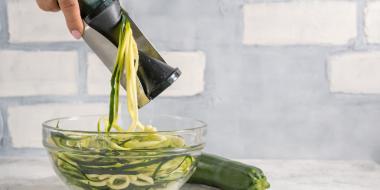The immune system is a network of cells and organs that defend our body against foreign invaders like bacteria, viruses, fungi, and parasites.
Every day we are exposed to countless microbes. A healthy immune response identifies them, and removes the ones that are likely to cause trouble. However, when the immune system is weakened, these bugs have a better chance of surviving and causing illness. Many factors influence our immune function like sleep, stress, past microbial exposure, and very importantly, our diet.
Did you know that what your child eats can determine if they get sick, and the severity and duration of that sickness? It's true! There are foods that are known to strengthen your immunity, and foods that deplete it. Whether it is a cold, flu, or an upset stomach, a diet that promotes your innate ability to stay healthy is key.
Let's explore the different areas that can deplete your immune system, and what you can focus on instead to keep your family strong and healthy!

Cut the sugar
Ingesting 75-100g of simple sugar (or the amount found in two average 12 oz sodas) lowers white blood cell activity for up to five hours. It results in a 50% reduction in the ability of these cells to engulf bacteria, thereby lowering your immune response. Start the habit of reading labels and familiarizing yourself with hidden sugar content in foods.
Replace with antioxidant rich fruits and vegetables
Antioxidants are a group of vitamins, minerals, and enzymes that help protect the body from the formation of free radicals. Free radicals are atoms that damage our cells, impair immune function, and lead to infection. Free radicals may form spontaneously or they may be the result of exposure to heat, light or something in the environment. Free radical scavengers are needed to neutralize these free radicals (who knew the immune system was so exciting?!). These scavengers are often referred to as anti-oxidants, because they prevent a process called oxidation of the free radicals, which is what causes the damage to our cells. Vitamins A, C, E, and selenium are great examples of these super-hero antioxidants. This means loading up on all sorts of greens, berries, citrus, carrots, and more. Luckily most of these are an easy sell to little ones. If not, try hiding them in a smoothie!
Cut the processed foods
These are packed with sugar, rancid fats, sodium, genetically modified ingredients, and food colouring. All of these will increase inflammation in the body, and deplete the body’s resilience to fight off infections.
Replace with simple whole foods without an ingredient list
Add lots of herbs like garlic, oregano, and thyme to your home cooking. Include essential fats from fish, raw nuts, and seeds to naturally decrease inflammation and support a robust immune response. If you are concerned about getting your kids on board with these foods, be creative and sneak them into soups and stews.
Cut mucous-forming foods
Dairy products increase and thicken mucous production, as do deep fried foods and unhealthy fats. This is problematic for upper respiratory tract infections, as well as gastrointestinal ailments. If secretions are thick and dry, they are more difficult to expel, prolonging the illness. Children are particularly susceptible to this type of congestion due to their narrow, short, and curvy anatomical passages. Conditions involving copious mucous tend to linger in these little ones, so pay attention.
Replace with lots of fluids including water, bone broths, and herbal teas
These work to thin the mucous and keep hydrated and bone broth is very healing. In conditions involving fever or diarrhea, hydration is of utmost importance. Chamomile, ginger, and peppermint are great ‘go to’ teas that are safe in children and can help address many different types of infection. You can also freeze teas in popsicle molds sweetened with a touch of manuka honey (for kids over 1 year) to make them sweeter.
Include fermented foods
These foods are full of several strains of beneficial bacteria. Whenever we are sick, a disruption in the balance of harmful and beneficial microbes has occurred. Eating fermented foods will help to re-establish this equilibrium, and crowd out the detrimental germs. Great examples are tempeh, miso, sauerkraut, kimchi, pickles, and more. Include a small amount of these alongside your main meal.
Kids often lose their appetite when they are sick (especially during fever or nausea). My rule of thumb is to trust their instinct, and do your best to offer fluids and simple options. Don’t worry, your little one’s appetite will return as soon as their bodies have healed sufficiently to devote energy back to digestion.
Regardless of what kind of sickness your child has contracted, it is no fun for anyone. Use these dietary tips to help along the way. If these suggestions are large departures from your regular routine, simply take baby steps. A strong immune system, through a nourishing diet, positive lifestyle, and regular practice, is essential for a vital, healthy, and long life.






